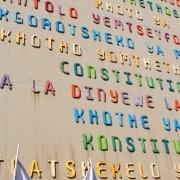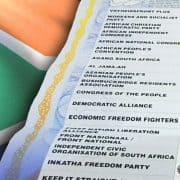|
Getting your Trinity Audio player ready...
|
By Gary Pienaar and Collette Schulz-Herzenberg
First published on Human Sciences Research Council
Money plays a fundamental role in a democracy. Political parties need to reach their constituencies and inform them of their policies. Not disclosing private donations can lead to corruption, cronyism and policy capture, but would disclosing donations necessarily increase public trust? In part two of our political party finance series, Gary Pienaar and Collette Schulz-Herzenberg pick up on this crucial debate. Part one looked at the Money, Politics and Transparency (MPT) global study on political finance.
While South African political parties receive funding from the state and are obliged to account for their expenditure of these funds, there are no restrictions on private donations to parties. Political parties do not have to disclose their sources of private funds, nor are they subject to limits on donations or spending caps. South Africa is not alone in this regard.
The recent Global Integrity MPT report comparing political finance in more than 50 countries found that about half of political parties failed to regulate cash donations.
MPT is a joint initiative between the Sunlight Foundation, Global Integrity and the Electoral Integrity Project, created to foster a network of national-level reformers by providing resources, such as in-depth research, analysis and global principles, on political finance. The MPT report, to which the authors of this article contributed, is a result of consensus reached within the reform community on a set of global principles to guide fair, accountable and transparent political finance systems.
Money is essential to democracy. Democratic politics is expensive, and parties need money to reach their electorates and inform policy. However, abuse of money in politics increases corruption, cronyism and policy capture. Regulatory deficits render politics opaque, obscuring the influence of private interests on public policy choices. Annually, millions of rands from undisclosed private donors flow into the coffers of South Africa’s larger parties, raising the question of the extent to which citizens really shape politics.
The MPT report also found that political financing reforms usually resulted from pressures emanating from political scandals, or supportive judicial decisions and interpretations, and declining levels of public trust in political parties. If so, South Africa is ripe for reform, as these conditions are both present and compelling, with numerous political funding scandals affecting both governing and opposition parties.
How to make ‘My Vote Count’?
A recent constitutional court case brought by My Vote Counts (MVC) to compel parliament to pass promised legislation to regulate private funding of political parties was unsuccessful. However, a substantial minority judgment held that MVC’s arguments were persuasive, finding that information about private sources of political party funding was required for the informed exercise of the right to vote. Furthermore, numerous public opinion surveys show a clear decline in trust in South African political parties over time. Political parties are among the least trusted institutions, eclipsing even the police, an institution widely regarded by South Africans as corrupt, inefficient and ineffective (Reconciliation Barometer; Afrobarometer).
Which reforms best suit South Africa? The MPT report found no single approach or policy instrument to be ideal. Instead, it recommended a mix of policy options that complemented a country’s particular socio-political context. It emphasised the need for state capacity to enforce its chosen system, and perhaps most importantly, warned that reforms could have unanticipated negative effects on the broader body politic.
Proponents of reform in South Africa have long called for greater transparency through disclosure laws to oblige political parties to publicly list the details of their private donors, and the larger amounts they receive. Would transparency suffice in the fight for more accountable, transparent and inclusive politics? A Brazilian case is instructive for South African policy-makers.
Analysts of Brazilian politics conclude that disclosed donations continue to undermine public trust. While disclosure laws have allowed intense scrutiny of corporate donations, greater transparency has inadvertently increased citizen dissatisfaction. Brazen financial ties between Brazilian politicians and the private sector and a series of scandals called into question politicians’ commitment to the public interest.
In September 2015, Brazil’s Supreme Federal Court responded with a landmark judgment banning corporate funding in politics when it declared null and void a clause in the country’s electoral act that allowed corporate donations to political parties and candidates. The court found that corporate donations were unconstitutional because they undermined the rights of citizens to elect their government.
Unintended consequences of barring private funding
Removing the root of the problem in its entirety is tempting. Nonetheless, an outright ban on third-party donations could have unintended and even perverse effects on party politics. Currently, the governing African National Congress (ANC), by virtue of incumbency, receives the vast bulk of private donations, with much smaller amounts going to even the largest opposition parties. A ban would therefore encourage a more equitable environment for smaller parties by ensuring the largest parties had less to spend on campaign activities and advertising.
However, a ban could also undermine the growth of more competitive electoral politics, commonly identified as a key weakness in South African democracy. The larger opposition parties that do attract some private funds and are able to wage competitive campaigns would see such a ban diminish their ability to penetrate new constituencies and grow their support, while the smallest political parties would remain largely unaffected.
In a dominant party system like South Africa, where one party repeatedly secures the vast majority of votes, larger opposition parties arguably require access to private donations to enable them to reach new voters with a coherent and convincing message. Removing the revenue stream that allows them to effectively challenge the ANC may inadvertently entrench ANC dominance in a political environment where greater accountability and competition are sorely needed.
A ban could reduce the financial dominance of larger parties in electoral contests, but could also encourage parties to explore other avenues to access campaign resources, such as the use of state resources for electoral gain – an activity found to be prevalent in 94% of the countries studied in the MPT report. The ANC already stands accused of extensive targeting of state resources, including spending on public infrastructure, budgets and state goods to support its 2014 campaign, creating an undue advantage.
While a ban could reduce opportunities for improper influence by private interests, there is no guarantee that it would completely erase the risk. In fact, bans tend to make determined donors more creative and devious in their efforts to influence people in powerful positions, which, in turn, make oversight and monitoring far more complex. The Open Society Foundation’s Money and Politics Project found that foreign regulatory oversight had caused listed South African companies to end official donations. However, growing political party receipts suggest that donations could continue via individual directors and unlisted companies.
A key concern therefore is whether, realistically, a regulatory ban can be effectively implemented and what mechanisms are available to detect any illegal donations.
Mixture of regulations for greater transparency and fairness
A ban on private donations cannot occur in isolation from other remedial efforts. To compensate for bans, and to ensure political parties can cover escalating campaign costs (like advertising), public funding reform should focus on reassessing the current parliamentary allocation of funds. Currently, 90% of allocated election funds are provided according to each party’s share of seats, while the remaining 10% is equitably allocated between all parties. This disproportionately benefits larger parties. There is also a need to increase public funding. This would certainly be consistent with global trends. The MPT report found inequitable public funding to be widespread, but also found increased public subsidies to be among the most popular recent reforms.
South Africa may prefer a mix of regulatory policies for greater transparency through donor disclosure laws, with a limit on campaign spending and an expansion of public funds. Disclosure permits additional funds to be made available beyond the cash-strapped public purse, but importantly, assists the detection of undue influence of donations by enabling monitoring of how the actions of political parties might benefit donors. Capping campaign expenditure on advertising and related activities to level the playing field has proved effective in the UK, according to the MPT report.
Tighter regulations to curb abuse
Any restrictions on contributions or spending must extend beyond political parties to their individual members, effectively closing loopholes for individuals to receive donations or spend to the benefit of their parties. Tighter regulations to curb the abuse of state resources will certainly be required. Information pertaining to larger donations and related spending must be made publicly available in a timely manner, in order to meaningfully uphold the constitutional principle to access to information. Finally, oversight bodies must be non-partisan, merit-based and independent (the IEC, for example, performed well in MPT’s comparative study).
Restrictions on contributions must extend beyond political parties to their individual members, closing loopholes for individuals to receive donations
Proponents of reforms should moderate their expectations. While these measures should help to create a more transparent and equitable political environment, the MPT research found little evidence to suggest a direct causal link between reforms and heightened public satisfaction or greater electoral participation. The full benefits of clean politics tend to show themselves long after reforms have taken place.
View the 2015 Money, Politics and Transparency report at http://moneypoliticstransparency.org/








